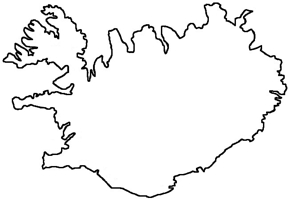
|
The Society of Folk Dance Historians (SFDH) Iceland
[
Home |
About |
Encyclopedia | CLICK IMAGE TO ENLARGE |

|
BACKGROUND
Information: A country.
Iceland is a Nordic island country in the North Atlantic and is the most sparsely populated country in Europe. Iceland is volcanically and geologically active. The interior consists of a plateau characterised by sand and lava fields, mountains, and glaciers, and many glacial rivers flow to the sea through the lowlands. Icelandic culture is founded upon the nation's Scandinavian heritage. Most Icelanders are descendants of Norse and Gaelic settlers.
In the wake of the French Revolution and the Napoleonic Wars, Iceland's struggle for independence took form and culminated in independence in 1918 and the founding of a republic in 1944. Iceland prospered during the Second World War. The immediate post-war period was followed by substantial economic growth, driven by industrialisation of the fishing industry and the United States Marshall Plan programme, through which Icelanders received the most aid per capita of any European country
National Dance: Vikivaki
Location: Scandinavia
Language: Icelandic, a North Germanic language, is descended from Old West Norse and is closely related to Faroese and West Norwegian dialects.
Religion: Church of Iceland
Music: "Voices"
Anecdote: Danish colonial rulers (Pietists) forbad music in the 18th century as promoting immorality. What remains is largely vocal, with mixolydian mode, harmony in 5ths, and nasal, drawn out final notes.
DOCUMENT
- Beware of Gift Giving Customs in Foreign Lands, a list.
- Beware of Your Behavior in Foreign Lands, a list.
- Europe, a region.
- Scandinavia, a region.
This page © 2018 by Ron Houston.
Please do not copy any part of this page without including this copyright notice.
Please do not copy small portions out of context.
Please do not copy large portions without permission from Ron Houston.